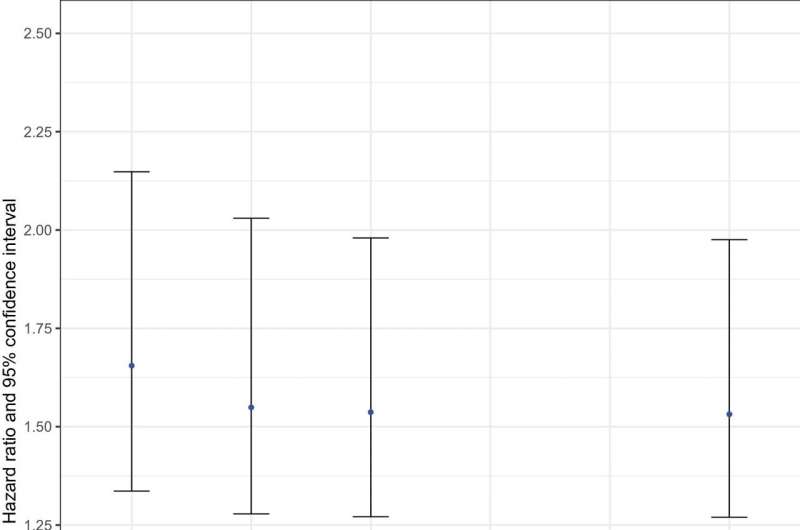This article has been reviewed according to Science X's editorial process and policies. Editors have highlighted the following attributes while ensuring the content's credibility:
fact-checked
trusted source
proofread
Renal hyperfiltration: The underestimated risk factor for mortality

Renal hyperfiltration may be an underestimated risk factor for mortality, according to new research from the University of Eastern Finland.
Conventionally, diminished kidney function is linked to chronic kidney disease and elevated risk of mortality. Renal hyperfiltration (RHF), or increased kidney function, has been largely dismissed as a normal observation in the general population and an expected manifestation of diabetes mellitus where it precedes renal decline. The condition, devoid of clinical manifestations, remains unknown to general medicine and is primarily screened and managed within the context of diabetes mellitus.
Two recent studies conducted at the University of Eastern Finland and published in the International Urology and Nephrology journal reveal that the harms of RHF might be highly underestimated, independent of diabetes mellitus. These studies emphasize the need to re-evaluate current RHF definitions and screening strategies in order to effectively reduce its impact on public health.
The first study suggests that the optimal limit to define RHF may be much lower than previously thought. By analyzing the risk of early death associated with high kidney filtration rates in 1,187 non-diabetic middle-aged Finnish men, the researchers found that a lower kidney filtration rate threshold could serve as a more precise measure for defining RHF.
This finding implies that the risk of early death related to RHF has been underestimated in the past. This conclusion is in line with a previous study, which found that up to 35% of Korean middle-aged men might be at increased risk of mortality due to RHF.
The second study investigated the role of diabetes mellitus in the relationship between RHF and mortality. Using a cohort of 2,682 Finnish men, the researchers demonstrated that RHF is associated with an increased risk of mortality, irrespective of the effect of diabetes mellitus. This suggests that RHF should be acknowledged and considered as a mortality-associated condition, regardless of a patient's diabetes mellitus status.
Both studies were based on data from the Kuopio Ischaemic Heart Disease Risk Factor Study.
These two studies support evidence that RHF is a significant risk factor for early death and underscore the need to evaluate the potential benefits of integrating RHF screening into routine medical care, for both patients with and without diabetes. The authors call on the research community to further investigate RHF as an independent health condition and emphasize the need for a uniform and consensual definition of RHF, as higher-than-normal kidney function is not without consequences.
Lead author of the studies, Dr. Mounir Ould Setti, commented, "The burden of increased kidney filtration within what is still considered normal kidney function was highly underestimated. Our findings suggest that RHF should be considered a potential risk factor for mortality, and that we need a better understanding of its underlying mechanisms."
These two studies provide critical insights into the mortality risk of RHF, highlighting the need for further research into its diagnosis, and ultimately, the development of more effective interventions to reduce the mortality burden associated with this condition.
More information: Mounir Ould Setti et al, Mortality-based definition of renal hyperfiltration in middle-aged men: a 35-year cohort from Finland, International Urology and Nephrology (2021). DOI: 10.1007/s11255-021-03048-6
Mounir Ould Setti et al, The association between renal hyperfiltration and mortality is not mediated by diabetes mellitus, International Urology and Nephrology (2023). DOI: 10.1007/s11255-023-03562-9

















